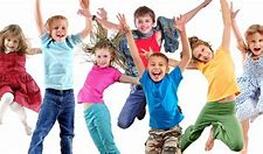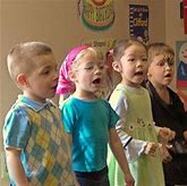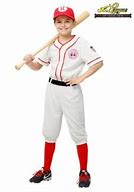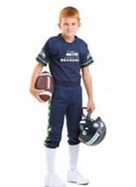
A wise leader will have the children go through a routine of breathing exercises and vocalises to help children channel their energies and make the best sounds possible. Too many times, I hear directors call out to the children on stage, "Sing out! Yell! I can't hear you!" Isn't it curious that kids can't be heard on stage, but they can certainly be heard when they are supposed to be quiet backstage?

The director can help by choosing material that is geared to the particular children's strengths. It is thought that most children sing best in roughly a one octave range, Middle C up to Treble C. There are many children that have wider ranges than that, but as a whole, this is a good, accepted range for most children.
Children learn easily and best when the song is modeled for them with proper singing. They seem to effortlessly mimic how the vocal sound is produced and the inflections used. Many kids have trouble matching pitch when the song is modeled by a deep, low voice in a deep, low register. Better to have the model sing in the Treble clef with a light, child-like quality. It can be amazing how fast children can learn the melodies and the words when given a good model to follow.
The actual Warm-ups to use can be varied, but should consist of scales, and skips, and motives up and down in their range. The best ones have little nonsense rhymes to go with the notes such as "Mommy Made Me Mash My M & M's" singing down the 5-note major scale. The repetitive M sounds help focus the placement of the vowel and encourage singing in tune as well as using good breath support. Besides, a fun, non-sense rhyme is much more interesting to sing than just vowels! I have collected other fun Tongue Twister Vocalises you could try. A few minutes of vocal warm-ups can improve the energy, focus and polish of any show!


 RSS Feed
RSS Feed